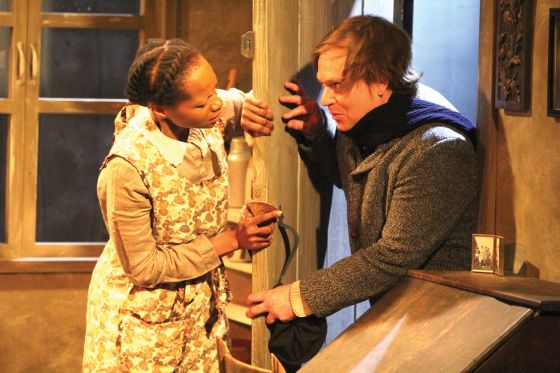
Calamity West's Hinter begins with the last of five murders, walks us through the police investigation and then flashes back to acquaint us with the events leading up to the crime itself. Audiences may cry "foul" at the playwright's refusal to reveal whodunit by the end of the thriller, but those listening closely will have gathered enough information to speculate on the identity of the villain(s) whose motives may lie in individual perversion, opportunistic deception or spectral miasma, but whose culpability leaves everyone with, literally, blood on their hands. What is certain, observes our weary detective, is that in isolated, sparsely populated, economically depressed, war-devastated regions, "these things happen." The region, in this case, is a farm, known locally as "Hinterkaifeck"—its very name locating it "behind" the rural Bavarian village of Kaifeck—in 1922, barely two years after the cessation of World War One, where widowed women work the fields, the menfolk mostly having emerged from the conflict either dead or crippled. The Gruber family—old Andres, his wife Cazillia, their daughter Viktoria and infant granddaughter, Ilse—employ two servants, stablehand Klara and housekeeper Maria, the latter recently hired following her predecessor Elizabeth's abrupt departure. The land surrounding the Gruber household, you see, is haunted by preternatural manifestations—phenomena affirmed by local citizens George and Lorenz, but dismissed by city-born neighbor Frieda. "Can someone be haunted by a living person?" asks a character, after recalling parents warning children to beware of "witches" in the woods—mythology perhaps fabricated from rumors of a sexual predator lurking nearby and incest leading to illicit progeny. What about the large sum of cash concealed in the house on the fatal night—were the Gruber women planning an escape? Were Elizabeth and Klara really seen by the barn "naked and touching" one another? What does Maria's decidedly un-servile attitude mean? How dangerous is the shell-shocked Lorenz? Oh, and how do we explain the distant screams, footsteps in empty rooms, and locked doors opening with no visible human assistance? The tiny Steep Theater performance space succeeds in suggesting the bleak landscape just outside the kitchen (which assumes the ambience of a prison cell). Combined with the emotional intensity displayed by Brad DeFabo Akin's direction of a laser-focused cast, the suspense generated as each clue surfaces is as provocative as it is persistent.
